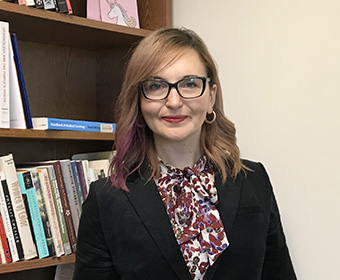Posted on February 13, 2019 by Michelle Skidmore

Todic’s research framework includes restorative justice in schools as a health equity intervention.
(Feb. 14, 2019) - Jelena Todic is an assistant professor in the UTSA Department of Social Work whose expertise includes health equity, organizational development, and social justice education. Her research focuses on social determinants of health and place-based interventions that have the potential to eliminate health disparities by targeting the social determinants of health and their fundamental drivers.
The UTSA faculty member earned her bachelor's degree of Arts in Psychology from the University of Nevada-Reno, a master's in Social Work from Washington University in St. Louis and a Ph.D. in Social Work from UT-Austin.
We sat down with Professor Todic this week to learn more about her research.
What's exciting you the most these days?
In my social work practice, I have previously partnered with leaders and activists who are working to improve quality of life and eliminate inequities in their communities. This continues to be a priority in my social work scholarship.
In 2017, I started working with Jennifer Scott from Louisiana State University and the Victoria County Public Health Department. We conducted a health needs assessment in two large unincorporated communities in the county, using social determinants of health framework to guide our data collection. The framework recognizes that individual biology and behaviors like exercise matter but that conditions of daily life—social and economic opportunities, education quality and workplace safety, for example—also play a vital role in determining our health outcomes.
In December 2018, we presented our findings and made recommendations for next steps to the County's Commissioners' Court. We underscored that in addition to increasing access to health care services, fresh healthy food and transportation, an intentional focus on improving economic opportunities, access to reliable information, social capital, community competence and the physical environment (e.g., sidewalks and public spaces) were crucial in promoting community health.
The area Commissioner already used the findings from our preliminary report to obtain a grant and renovate an informal basketball court. The project will improve access to public and recreational spaces. We have been assembling a team of transdisciplinary researchers to seek funding and work in partnership with the community leaders to implement our recommendations. The team includes the UTSA Institute for Economic Development in addition to social work, public health, and planning scholars from UTSA and UT-Austin.
What's the one thing going on in your field that nobody's talking about?
We need to better tackle the strong relationship between daily living conditions and health, especially in communities experiencing poverty, racism, and other forms of structural oppression. Over time, providing social services and individual level interventions have become our field's main focus. These are important. At the same time, social work health equity efforts must also focus on primary prevention and upstream interventions that target economic and social disadvantage as causes for poor health outcomes.
We, the researchers, need to be better at partnering with communities to develop and evaluate interventions that aim to change organizational and community conditions as a way to improve population health. For example, more than 30 years of research provides consistent evidence for a strong relationship between education and health, with more educated adults living longer and healthier lives, even after controlling for income and occupation. While high school graduation rates have notably improved over time, we still see disparities based on ethnicity and socioeconomic status.
Making sure that all students finish high school is one important step toward reducing health disparities and improving population health. While state and federal social and economic policy changes may be the ultimate solution for eliminating health inequities, we can do a lot at the school and district levels to eliminate disparities in high school graduation.
Can you tell us about your current research and the impact you think it will have?
My research broadly focuses on improving health using place-based interventions. It's my hope that the research will contribute to a body of evidence for interventions at the neighborhood, organization or community levels to support bottom-up changes in community conditions.
I am currently working on two articles based on my dissertation research that frame restorative justice in schools as a health equity intervention. School-based restorative justice has been widely understood as an approach to interrupting the school-to-prison pipeline. Surprisingly, despite its simultaneous positive impact on factors associated with adolescent and adult health—academic success, school safety, connectedness and social support, most scholars and practitioners do not associate restorative justice with public health.
This research is especially important in the United States because the school-to-prison pipeline disproportionately impacts African-Americans, Latinos, Native Americans and youth with disabilities, populations that all experience health inequities.
What drew you to UTSA?
Addressing complex challenges like health inequities requires transdisciplinary knowledge and action. I was beyond excited when I learned that the Department of Social Work was a part of the College of Public Policy, together with demography, public administration and criminal justice. I have the fortunate opportunity to work with a group of talented, ambitious and kind colleagues and students.
I also fell in love with Texas during my Ph.D. program at UT-Austin.
Any advice for this generation of students?
Have a vision for the world you want to live in then be methodical about becoming a change agent that brings that vision to fruition. In program design, we call this line of thinking a "logic model." Think about your overall aim and outline the short and long-term goals supporting that aim. Then plan activities (outputs) that will help you accomplish these goals and inputs that will allow you to do those activities well. Your inputs may include formal and informal education, self-awareness, experiences and relationships but are certainly not limited to that.
And do not underestimate the value of joy.

